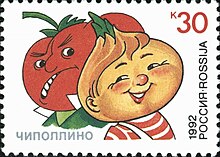Il Pioniere
| Former editors |
|
|---|---|
| Categories | Children's magazine |
| Frequency | Weekly |
| Founded | 1950 |
| Final issue | 1970 |
| Country | Italy |
| Based in | Rome |
| Language | Italian |
| Part of a series on |
| Communism in Italy |
|---|
 |
|
|
Il Pioniere (Italian: The Pioneer) was a weekly children's comic magazine which existed between 1950 and 1970. It was headquartered in Rome, Italy. The magazine was close to the Italian Communist Party although it did not overtly contain political writings.
History and profile
[edit]
Il Pioniere was founded in Rome as a weekly magazine in 1950.[1] The magazine was the official media outlet of a scout organization, namely Italian Pioneers' Association.[2] The Communist Party officials invited Gianni Rodari to Rome to launch Il Pioniere.[1] Its first directors of the magazine were Gianni Rodari and Dina Rinaldi.[2][3] Rodari served in the post until 1953.[4]
Il Pioniere supported anti-fascism, democracy and pacifism.[2] The magazine did not contain any political messages, but attempted to provide a moral and ideal message using its illustrated stories and tales to its readers.[2] However, it featured leading Communist leaders, including Yugoslav leade Josip Broz Tito.[5] It covered Italian comics, including Cipollino, Chiodino and Atomino, and did not feature any American comics.[2]
Il Pioniere began to decline in 1966 and folded in 1970.[2]
References
[edit]- ^ a b Maria Luisa Salvadori; Alessandra Asteriti Mathys (April 2002). "Apologizing to the ancient fable: Gianni Rodari and his influence on italian children's literature". The Lion and the Unicorn. 26 (2): 175. doi:10.1353/uni.2002.0027. S2CID 144451874.
- ^ a b c d e f Judi Mara (14 October 2021). "When Italy's Communists Made Comics for Children". Jacobin. Archived from the original on 19 October 2021. Retrieved 24 October 2021.
- ^ Gianni Rodari; Jack Ripes (2009). "The War of the Bells". Marvels & Tales. 23 (1): 91–92. JSTOR 41388903. ProQuest 230779350.
- ^ Ilaria Filograsso (2020). "Language Play in Adult-Child Relationships: Gianni Rodari's Pedagogical and Literary Concepts". In Justyna Deszcz-Tryhubczak; Irena Kalla (eds.). Rulers of Literary Playgrounds: Politics of Intergenerational Play in Children's Literature. New York; London: Routledge. p. 110. ISBN 978-1-000-20605-0.
- ^ Roberta Altin; Claudio Minca (2018). ""That Thin Red Line": Memory and Yugonostalgia among the Italian Minority in Istria". Narodna umjetnost: Hrvatski časopis za etnologiju i folkloristiku. 55 (1): 118. doi:10.15176/vol55no107. hdl:11368/2931748. S2CID 188245306.
- 1950 establishments in Italy
- 1970 disestablishments in Italy
- Anti-fascism in Italy
- Comics magazines published in Italy
- Defunct children's magazines published in Italy
- Defunct communist magazines
- Defunct Italian-language magazines
- Magazines established in 1950
- Magazines disestablished in 1970
- Magazines published in Rome
- Weekly magazines published in Italy
